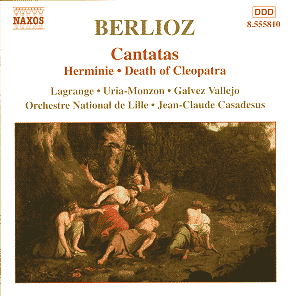This
fascinating recording has been languishing in Naxos’s vaults for
8 years. Why I can’t imagine, as it is another in the sterling
series of French music recordings being made by Jean-Claude Casadesus
and his Lille orchestra and chorus. It has been advertised by
Naxos as being an issue containing unknown choral works by Berlioz.
This not strictly true as most of the disc’s contents are or certainly
have been available before.
Both
Herminie and La Mort de Cléopâtre have been issued
before in first class recordings by Dame Janet Baker, La Mort
d’Orphée on a well praised recording by Jean Fournet on
Denon (no longer available), but as far as I can tell Naxos is
correct with respect to La Mort de Sardanapale.
The
four works were all entries by Berlioz to the Prix du Rome, which
he won on the fourth attempt with La Mort de Sardanapale. Listening
to all four, I can’t help but feel that the eventual winner is
the least interesting work – perhaps it is because the others
are better known, although I don’t think so.
The
first two are settings for female voice and orchestra, and fans
of the composer will recognise themes from other Berlioz works
in these early cantatas. It is probable that the themes had their
earliest outings here, being used later in the more familiar guises.
Elements of Lélio, Symphonie fantastique, are used freely
to enhance the already highly lyrical backdrop to these works.
What
of the performances? Jean-Claude Casadesus has an instinctive
feel for these works and he is aided and abetted by the tonal
quality of the orchestra. The Orchestre Nationale de Lille has
the sound of a Berlioz ensemble – those fans of the composer,
like me, will know what I means – full blooded brass, highly accurate
woodwinds and an excellent string section, all able to negotiate
around Berlioz’s difficult harmonies as to the manner born. Allied
to this, Naxos has provided a very natural acoustic in which to
record all this activity.
The
soloists are first class. Too often recordings like this are ruined
by soloists who wobble or shout or at worst, both. All three vocalists
in these cantatas excel themselves and as they are all native
French singers or French trained, the words come over most naturally.
The Palais de Lille, as recorded here, exhibits a very warm acoustic
with a slight echo which enhances these exciting, accurate performances.
We should not be too worried that the original score of La Mort
de Sardanapale has been lost, and this is a reconstruction from
orchestral parts. It is a very good opportunity for fans of Berlioz
to get a further fix – there is no Roméo et Juliette or
Requiem here, but the repertoire is not generally available except
for La Mort de Cléopâtre and Herminie and this disc
is a good way of getting hold of excellent, well sung, played
and recorded evidence of the composer’s history with La Prix de
Rome.
John
Phillips
